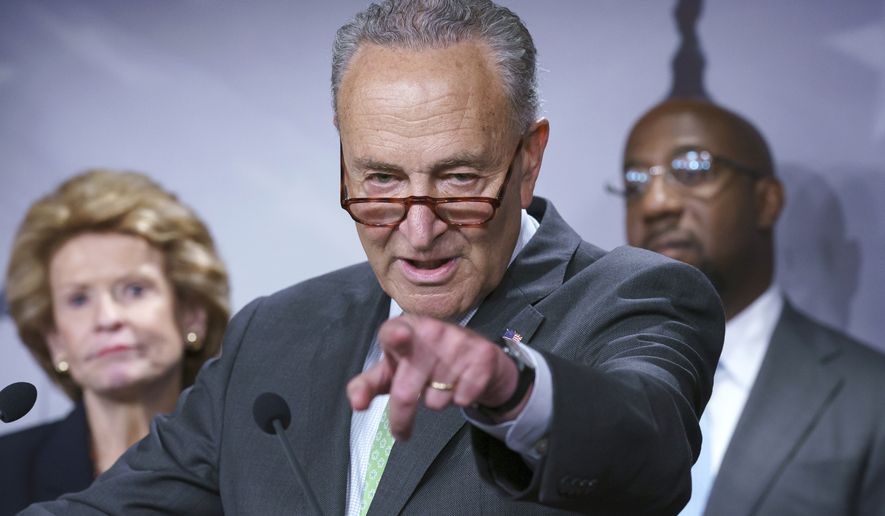Senate Majority Leader Charles E. Schumer is pressing Democrats and Republicans to wrap up negotiations on a conventional infrastructure bill and a “human infrastructure” bill ahead of the August recess.
Mr. Schumer, New York Democrat, said Thursday that he was setting a hard deadline of next week for both deals so they could be presented to the Senate for consideration.
“All parties involved in the bipartisan infrastructure bill talks must now finalize their agreement so that the Senate can begin considering that legislation next week,” he said. “I am setting the same deadline next Wednesday for the entire Senate Democratic Caucus to agree to move forward on the budget resolution with reconciliation. … The time has come to make progress, and we will.”
The deadline adds pressure to senators haggling over the $1.2 bipartisan infrastructure deal and the Democrat’s go-it-alone $3.5 trillion package of health care, child care and anti-poverty spending that the administration dubbed “human infrastructure.”
President Biden said he is confident that Congress will get the job done and that Republicans will provide the necessary support to pass the package of traditional infrastructure projects.
“I’ve watched and listened [as] the press declared my initiative dead at least 10 times so far,” Mr. Biden said at a White House press conference. “I don’t think it’s dead; I think it’s still alive. I still have confidence we’re going to be able to get what I proposed and what I’ve agreed to in a bipartisan agreement on infrastructure.”
Last month, Mr. Biden and a bipartisan group of 11 lawmakers agreed to a tentative framework of the deal to spend $1.2 trillion over the next eight years on upgrading the nation’s roads, bridges, airports and seaports.
Of the sum, more than $550 billion comes from revenue streams that have yet to be made public. The exact nature of that funding is behind the holdup.
Democrats and Republicans say the package’s main selling point is that it does not raise taxes. Sticking to that promise, however, and coming up with the funding is proving difficult.
Working out an initial proposal to fund the deal by bolstering the Internal Revenue Service’s ability to crack down on tax cheats is proving particularly difficult.
“There’s got to be a product that has gone through the proper vetting and that we get it right. … It includes not just complications on the pay-for side, which we’re talking about right now, but also on the spending side,” said Sen. Rob Portman, Ohio Republican and one of the crafters of the bipartisan deal. “So there’s a lot of work to be done, and we’re working through it.”
Senate Democrats also have to figure out the full context of their $3.5 trillion package of social welfare programs. All 11 Democrats on the Senate Budget Committee set an outline for the proposal this week.
Although details remain sparse, many Democrats champion the deal as a “bold and robust” expansion of the social safety net.
“I think we are making progress in moving forward with the most consequential piece of legislation passed for working people since the 1930s,” said Mr. Sanders, an avowed socialist. “And it is legislation which is finally going to ask the wealthy and large corporations to start paying their fair share.”
The package includes long-sought liberal goals such as paid family leave, broadened access to child care and free community college. Money is further earmarked for racial justice programs and for local governments to deploy broadband internet service.
Pushing the package’s price tag upwards is a provision authored by Mr. Sanders that expands Medicare benefits to cover hearing, vision and dental services. Mr. Sanders further secured a change to the program’s prescription drug pricing system.
It is unclear whether such provisions are permitted in the reconciliation process, which allows some tax and spending bills to avoid the 60-vote filibuster threshold and pass by a simple majority of 51 votes.
Figuring out exactly what is acceptable under the rules is one of the reasons that the deal has yet to be hammered out.
Despite the hard work remaining on both deals, Mr. Schumer is pressing forward.
“Bottom line is there’s plenty of time to get this done, it’s almost a week, and we should get it done,” he said.
The push is partially about timing. Democrats have little time left in the legislative session before the August recess. Once lawmakers return, Congress is scheduled to begin its budgetary process, which will likely dominate most of the fall.
If infrastructure and reconciliation are not passed before the recess, Democrats might jettison the legislation in favor of a spending bill to keep the government open past the end of the fiscal year on Sept. 30.
Although logistics play a role, Mr. Schumer is motivated by political concerns. The longer Democrats wait before beginning consideration of both deals, the more time opponents have to mobilize opposition.
That much is evidenced by the political pressure campaign mounting in West Virginia against Sen. Joe Manchin III, a moderate Democrat and key swing vote. Mr. Manchin faces intense pressure to oppose the reconciliation package because of its immigration and clean energy provisions.
Mr. Schumer cannot afford a single defection among the chamber’s 50 Democrats on the reconciliation package.
• Haris Alic can be reached at halic@washingtontimes.com.




Please read our comment policy before commenting.